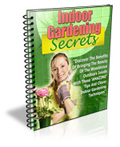Welcome to Gardening Guide
Container Gardening Book Article
 . For a permanent link to this article, or to bookmark it for further reading, click here.
. For a permanent link to this article, or to bookmark it for further reading, click here.
49-Tomato Gardening Container
from:There are few vegetables or, in this case, fruit with the mass appeal of tomatoes. They are incredibly versatile and can be used for salads, Italian dishes, and a wealth of other culinary masterpieces. Unfortunately, in some areas, tomatoes are being priced at over $3 a pound. The up side is that everyone, regardless of their available space can grow their own healthy, delicious tomatoes by planting them in a tomato gardening container.
All that is really necessary to grow your own tomatoes is a sunny climate. Of course there are a few other odds and ends that will make it easier. You will need containers. Five gallon sized pots work well. For best results plant one tomato plant per container. You will also need the tomato seeds or seedlings, soil, and wooden stakes to hold the plants up when they grow too tall. String is helpful for attaching the stalks to the stakes. You may find fertilizer and a plastic tray for drainage to be useful as well. Drainage is important in your choice of tomato gardening container.
Certain types of tomato plants seem to grow better in containers than others. Many experienced growers of container tomatoes suggest using the bush varieties of plants. Cherry tomatoes are popular because of their smaller size, but donít let that stop you from experimenting with the full sized versions. Early Girl and Celebrity do well with tomato gardening container use, as do Sweet 100s and Christmas Grape. Decide what size of tomato you want to grow and what purpose you want them for. For example, if you were planning to use your tomatoes primarily in salads, cherry or grape varieties would be an excellent choice.
Of course sufficient sunlight is vital with any type of plant. Before planting your tomatoes check the area you want to place your containers for roughly 4-6 hours of sun. Sunlight promotes good, steady growth. The right balance of water and sunlight is crucial for tomato gardening container success.
With all of the recent attention given to pesticide use in the media, growing your own tomatoes is one way to ensure you know exactly what you are getting in your produce. It is also economical and convenient. There wonít be any more need for a trip to the store because you forgot tomatoes. The containers donít take up a lot of space and only one tomato plant can yield all the produce one family needs. The low cost of a tomato gardening container is minimal when compared to the high price of tomatoes in a grocery store. What are you waiting for? Pick your favorite tomato, select a container, and enjoy the benefits of tomato container gardening.
Container Gardening Book News



